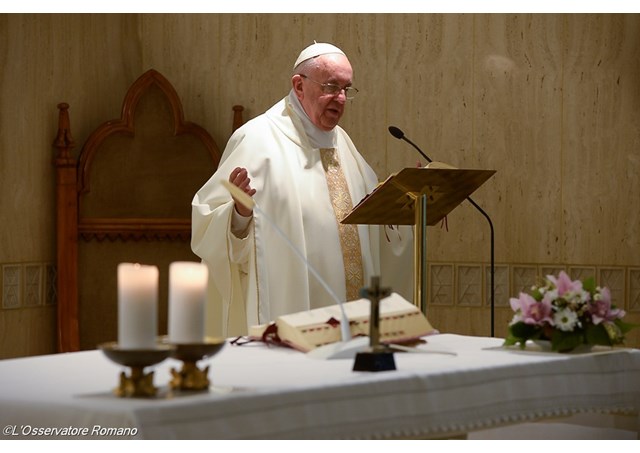
Pope Francis: the theology of poverty

(Vatican Radio) Pope Francis said Mass in the chapel of the Casa Santa Marta on Tuesday morning. Following the readings of the day, the Holy Father reflected on the place of poverty in the Gospel, saying that the Gospel becomes incomprehensible if poverty is removed from it, and that it is unfair to label priests who show a pastoral concern for the poor as, “Communists”.
Click below to hear our report
In the 1st reading, which tells of how St. Paul organized a collection in the Church of Corinth, for the benefit of to the Church of Jerusalem, whose members were facing great hardship. Pope Francis noted that, today as then, poverty is “a word that always embarrasses.” Many times, he said, we hear: “But this priest talks too much about poverty, this bishop speaks of poverty, this Christian, this nun talks about poverty ... aren’t they a little communist, right?” On the contrary, he warned, “Poverty is at the very center of the Gospel: if we remove poverty from the Gospel, no one would be able to understand anything about the message of Jesus.”
When faith does not reach the pockets it is not genuine
St. Paul, he said, speaking to the Church of Corinth, highlights what is their real wealth: “You are rich in everything, in faith, in speech, in knowledge, in all earnestness, and love that we have taught you.” The exhortation of the Apostle is: “as you are rich, be you also great in this generous work in “this collection”:
“If you have so much richness in the heart, these great riches of zeal, charity, the Word of God, the knowledge of God - let this wealth reach your pockets – and this is a golden rule: when faith does not come with pockets, not a genuine faith. It is a golden rule here that Paul says, in essence: ‘You are rich in many things now, so be generous in this work of generosity.’ here is this contrast between wealth and poverty. The Church of Jerusalem is poor, is in economic difficulty, but it is rich, because it has the treasure of the Gospel message. This poor Church of Jerusalem, has enriched the Church of Corinth with the Gospel message; it has given the richness of the Gospel.”
Let the poverty of Christ enrich us
Continuing his paraphrase of St. Paul, Pope Francis went on to call on all of us to follow the example of the Church of Corinth: the Church, whose members had a great deal of material wealth and so many things, who were poor without the proclamation of the Gospel, but who enriched the Church of Jerusalem, helping to build up the People of God. Here is the foundation of the “theology of poverty”: Jesus Christ, who was rich – with the very richness of God – made Himself poor, He lowered Himself for us. This then, is the meaning of the first Beatitude: ‘Blessed are the poor in spirit,’ i.e. “to be poor is to let oneself be enriched by the poverty of Christ, to desire not to be rich with other riches than those of Christ”:
“When we give help to the poor, we are not doing the work of aid agencies ‘in a Christian way’. Those are good, it is a decent thing to do – aid work is good and quite human – but it is not Christian poverty, which St. Paul desires of us and preaches to us. Christian poverty is that I give of my own, and not of that which is left over – I give even that, which I need for myself, to the poor person, because I know that he enriches me. Why does the poor person enrich me? Because Jesus Himself told us that He is in the poor person.”
Christian poverty is not an ideology
When one divests oneself of something, not only from our abundance, to give to a poor person, to a poor community, one is thereby enriched. Jesus acts in one who does this, when he does it, and Jesus acts in the poor person, who enriches one who gives to him of his substance:
“This is the theology of poverty: This is because poverty is at the heart of the Gospel; it is not an ideology. It is precisely this mystery, the mystery of Christ who humbled Himself, who let Himself be impoverished in order to enrich us. So it is understandable why the first of the Beatitudes is ‘Blessed are the poor in spirit.’ Being poor in spirit means going on this path of the Lord: the poverty of the Lord, who lowers Himself even so far as to become bread for us, in this sacrifice [of the Mass]. He continues to lower Himself into the history of the Church, into the memorial of His passion, and by the memorial of His humiliation, the memorial of His poverty, by this bread He enriches us.”
| All the contents on this site are copyrighted ©. |


